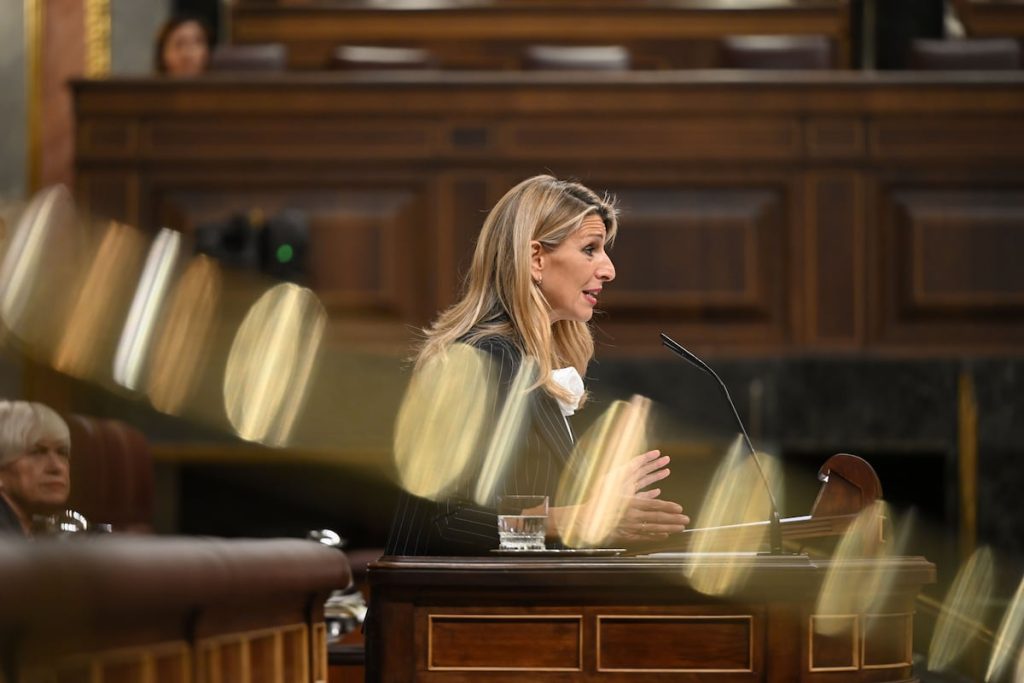PSOE and Sumar, partners of the coalition, have once again divided this Tuesday on military policy, this time prompted by the PP. The group led by Vice President Yolanda Díaz has agreed with the popular party – without the involvement of the PSOE, although they claim to have been informed – to give the green light to the processing of an initiative for the Congress to have to authorize new Defense missions abroad and the sending of arms. In exchange for their abstention, which was enough for the proposal to go ahead, the popular party voted in favor of Sumar’s reform to be able to claim abusive clauses in mortgage repayments from the bank to begin its parliamentary process. The PP’s bill passed with 174 votes in favor, 144 against, and 30 abstentions. Without Sumar’s position, it would not have progressed.
With the debate on their initiative, Alberto Núñez Feijóo’s party has once again tested the contradictions within the government and between the parties that make up the investiture bloc with a proposal that historically has not been disliked by left-wing parties, who have always demanded more transparency. The PSOE and other parties argue that a virtually identical proposal was already approved in the same terms in the Senate on September 24 and is currently being processed in the Defense Committee. This situation was criticized during the debate by the group spokespeople, who showed cohesion in labeling the PP’s move as a “nonsense” and “absurd”. “It is a lack of consideration for the legislative procedure,” said Socialist deputy José Antonio Rodríguez Salas in his speech, criticizing the mixing of technical and political issues in the proposal.
The PP’s proposition for a law reforming the National Defense Law for the sending of military aid abroad proposes that the Congress have the final say on authorizing operations abroad that are not directly related to the defense of Spain or national interests, with a validity period of five years. It also demands that for the delivery of military material to a war zone, the Government must request authorization from the full Congress in advance. This authorization will be annual, and renewals can be requested in the corresponding parliamentary committee. Among other aspects, the text requires that in the authorization request for a military mission abroad, the Government must determine the maximum number of necessary troops and equipment. “Increases in troops beyond that maximum must be approved by the Defense Committee prior to deployment,” it adds, leaving any modifications of resources in the hands of Congress.
Podemos has voted in favor of the proposal. The party announced an amendment for the authorization of missions to be for two years instead of five, and for the renewal to be annual. The leftist party also requests that the PP include in the text that selling weapons to countries committing genocide and violating human rights should not be allowed. “The rest is the hypocrisy we are accustomed to,” said deputy Javier Sánchez Serna in Parliament. The issue of military policy has caused several conflicts within the government and sparked a deep crisis in the coalition in 2022 over the delivery of military aid to Ukraine. This matter divided the PSOE and Unidas Podemos, but also created a split within UP. The military question has caused several disagreements within the coalition, not only over the delivery of military aid to Kiev but also regarding NATO summits and Defense spending increases.
In the summer of 2022, when a Defense spending increase was approved without UP’s knowledge, the Vice President even requested a meeting to monitor the coalition agreement. Vox has announced its support for the initiative, while other parties have criticized the PP for its approach. The debates surrounding military policy within the coalition continue to highlight the differences between the various parties, showing the complexity of maintaining consensus on such crucial issues. The future of military policy within the Spanish government remains uncertain as tensions and disagreements persist among coalition members.


